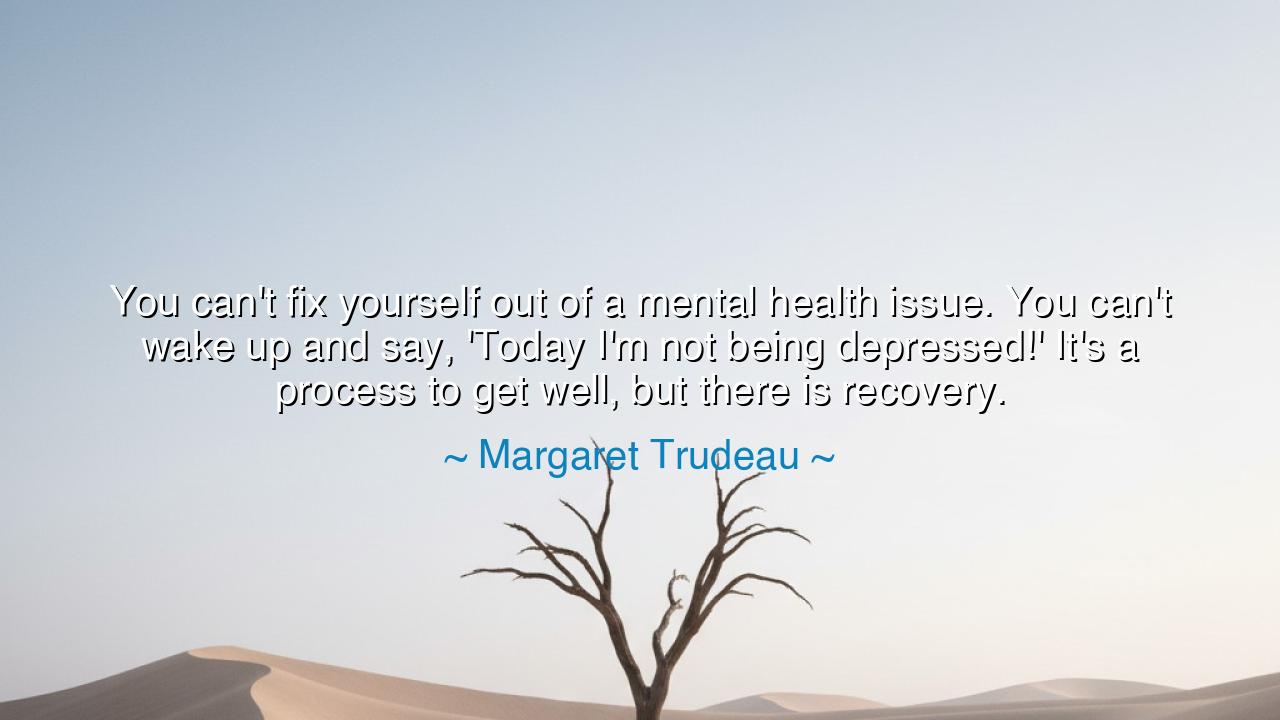
You can't fix yourself out of a mental health issue. You can't
You can't fix yourself out of a mental health issue. You can't wake up and say, 'Today I'm not being depressed!' It's a process to get well, but there is recovery.






In the tender and unflinching words of Margaret Trudeau, we find a truth that pierces through the illusions of self-sufficiency and pride: “You can’t fix yourself out of a mental health issue. You can’t wake up and say, ‘Today I’m not being depressed!’ It’s a process to get well, but there is recovery.” These words are not merely a reflection on illness; they are a hymn to the human condition, to the long, arduous journey of healing that the ancients would have called the purification of the soul. For in them lies both realism and hope — a recognition of the weight of suffering, and the quiet faith that healing, though slow, is possible.
In the days of the ancients, philosophers and healers alike spoke of balance — the harmony of body, mind, and spirit. They knew that the wounds of the soul could not be mended by sheer will alone, for the mind, when ill, cannot command itself to wholeness. Even the great physician Hippocrates warned that melancholy was not a weakness but a condition requiring understanding, care, and patience. Trudeau’s words carry that same timeless wisdom: that mental health is not conquered through denial or defiance, but through acceptance, compassion, and gradual restoration.
The origin of this quote rests in Margaret Trudeau’s own life — a life marked by brilliance and by struggle. As the wife of Canadian Prime Minister Pierre Trudeau, she lived in the glare of public life, yet behind that radiance lay years of suffering from bipolar disorder, a condition not well understood in her time. Her journey from despair to recovery became a beacon for countless others who faced their own unseen battles. When she says, “You can’t fix yourself,” she speaks as one who has tried — who has faced the mirror and commanded herself to rise, only to learn that the mind’s healing does not obey the mind’s will. It is a process, not an act; a pilgrimage, not a proclamation.
Consider the story of King Saul, the first ruler of Israel, who was tormented by an affliction of spirit that no crown could ease. The scriptures tell us that his anguish was calmed only by the music of David’s harp — not by command or conquest, but by the gentle balm of art and connection. So too, in our time, healing comes not through force, but through fellowship, therapy, medicine, and patience. Trudeau’s words remind us that to recover is not to triumph once, but to walk faithfully, step by step, toward light — even when the night is long.
Her message is also a challenge to the illusion of self-reliance, so often praised in modern life. We are told to “be strong,” to “snap out of it,” to carry on as though willpower alone could mend what is broken. But Trudeau’s wisdom breaks that illusion: strength is not denial; it is the courage to seek help. Healing begins not in solitude, but in surrender — in reaching out to those who can guide us toward balance. This is not weakness, but wisdom, for the soul that seeks support is the soul that has chosen to live.
Her words are also a testament to hope, the quiet force that endures beneath despair. When she says, “There is recovery,” it is not a promise of instant deliverance, but an affirmation of the human spirit’s capacity to mend. Healing is not a return to the past, but a rebirth into wholeness. It is the slow awakening of life after long darkness — like spring rising from winter. This hope, fragile yet enduring, has carried countless souls through the long corridors of illness toward the open air of peace.
Let this, then, be the lesson drawn from Margaret Trudeau’s wisdom: do not command yourself to be well; commit yourself to the journey of wellness. Do not measure healing by speed, but by sincerity. Seek help without shame; embrace patience without despair. Whether through medicine, therapy, prayer, or the embrace of loved ones, walk the path of recovery with courage. For though the road is long, there is a road — and on it lies the promise of dawn after the longest night.
So, my listener, remember: you are not broken because you cannot will yourself to wellness. You are human — and being human means healing takes time. Accept the process, trust in care, and hold fast to hope. As Margaret Trudeau teaches, though you cannot fix yourself in a day, you can walk, day by day, toward the horizon of recovery — and there, in the light of persistence and compassion, you will find peace.






AAdministratorAdministrator
Welcome, honored guests. Please leave a comment, we will respond soon